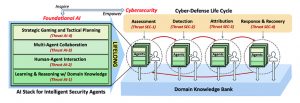
UW ECE Professor Radha Poovendran
UW ECE Professor Radha Poovendran has been named the UW lead for a new, multi-university institute, which will develop approaches that leverage artificial intelligence, or AI, to defend against cyberthreats that target the security and privacy of computer networks and their users. Poovendran is the founding director of the Network Security Lab at the UW, and he served as UW ECE chair from January 2015 to December 2019.
Launching on June 1 with support from the National Science Foundation, the AI Institute for Agent-based Cyber Threat Intelligence and Operation, or ACTION Institute, will initiate a revolutionary approach to cybersecurity, in which artificially intelligent security agents cooperate with humans to jointly improve security of complex computer systems over time. These AI security agents will be designed to continuously learn and adapt to cyberattacks and threats to system security, both on their own and in collaboration with human experts.
The ACTION Institute is a $20 million, five-year project, funded by a partnership between the NSF, the U.S. Department of Homeland Security’s Science and Technology Directorate, and IBM Corporation. It will be directed by Giovanni Vigna, a computer science professor and cybersecurity expert at the University of California at Santa Barbara, which is the lead university for the Institute.
“AI is used routinely now, for things like malware analysis to identify malicious documents and malicious web pages,” Vigna said in a recent UC Santa Barbara press release. “What we don’t have are entities that are capable of reasoning. This is an opportunity to bring artificial intelligence and security together in a novel way.”
The ACTION Institute’s UW research team includes Poovendran and Sewoong Oh, an associate professor in the Paul G. Allen School of Computer Science & Engineering. Poovendran and Oh, in collaboration with other Institute members, will be developing a new framework that models strategic interactions between AI security agents and their cyber adversaries. This novel framework will take into account operation in uncertain or unknown online environments where adequate knowledge about behavior of an adversary will not be available. The UW team will also develop algorithms that train and guide AI security agents in learning how to operate robustly in adversarial environments.
“Basically, we’ll be providing the AI security agents with a powerful mechanism for reasoning about adversarial engagement,” Poovendran said. “And that will enable AI security agents, in cooperation with humans, to successfully defend computer systems that are undergoing what very well might be a complex and strategic cyberattack.”
In addition to the research teams from UC Santa Barbara and the UW, the ACTION Institute includes collaborators from UC Berkeley, Purdue University, Georgia Tech, The University of Chicago, University of Illinois Chicago, Rutgers, Norfolk State University, University of Illinois, and the University of Virginia.
The big picture
The ACTION Institute is one of seven new AI-focused Institutes being launched by the NSF this summer, which represent a $140 million investment. It is part of a broader effort across the federal government to advance a cohesive approach to AI-related opportunities and risks. These new Institutes are part of the larger, NSF-funded AI Institutes research network, which represents close to half a billion dollars in funding and reaches almost every U.S. state.
“The National AI Research Institutes are a critical component of our nation’s AI innovation, infrastructure, technology, education, and partnerships ecosystem,” said NSF Director Sethuraman Panchanathan. “These institutes are driving discoveries that will ensure our country is at the forefront of the global AI revolution.”
The ACTION Institute will start its work by conducting research in four focus areas for AI security agents: learning and reasoning that incorporates domain knowledge, human-agent interaction, multi-agent collaboration, and strategic gaming and tactical planning. The researchers will aim to enable AI security agents to improve their domain knowledge over time. This, in turn, will empower the agents to grow increasingly robust and effective in the face of changes in adversaries’ modes of operation. AI agents will be able to compose defense strategies and tactical plans in the presence of uncertainty, collaborate with each other and with humans for mutually complementary teaming, and adapt to unfamiliar and novel attacks.

An illustrated overview of the ACTION Institute’s integrated AI and cybersecurity research. Illustration provided by the ACTION Institute.
Research by the ACTION Institute promises to have an important and far-reaching impact across the nation. Computer systems are increasingly central to national infrastructure in finance, medicine, manufacturing, defense, and other sectors of the economy. This infrastructure is at risk from sophisticated cyber-adversaries backed by powerful nation-states, whose capabilities rapidly evolve, demanding equally rapid responses.
“The ACTION Institute will help us better assess the opportunities and risks of rapidly evolving AI technology and its impact on DHS missions,” said Dimitri Kusnezov, Under Secretary for Science and Technology at the Department of Homeland Security. “This group of researchers and their ambition to push the limits of fundamental AI and apply new insights represents a significant investment in cybersecurity defense. These partnerships allow us to collectively remain on the forefront of leading-edge research for AI technologies.”
The Institute will function as a hub for the AI and cybersecurity communities, and its research efforts will be complemented by innovation in education for K–12 through postdoctoral students. Development of new tools for workforce development is part of the Institute’s mission, as is the creation of new opportunities for collaboration among the Institute’s participating organizations and with external industry partners.
“The ACTION Institute is part of a larger, comprehensive network of AI-focused Institutes being put into place by the National Science Foundation,” Poovendran said. “Over the long-term, this work taken in total, will greatly benefit our nation and people from all walks of life. With that in mind, I’m very excited to see what the future holds.”
For more information, read the recent NSF press release, article on the Allen School website, or visit the ACTION Institute website.

